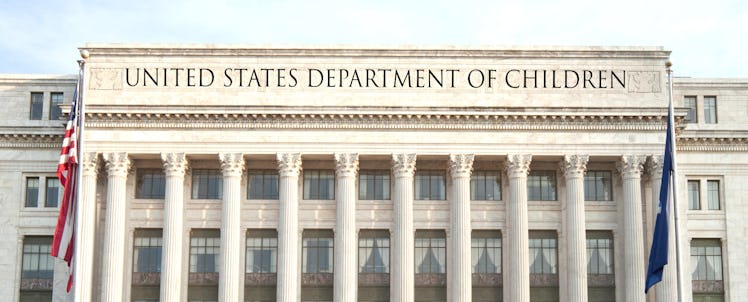The United States Should Have a Department of Children
The government has lost sight of its duty to protect kids, but the proposal for a new agency by an unlikely Democratic candidate may be exactly what kids in the U.S. need to thrive.

Marianne Williamson, the crystal-loving, California spiritual adviser trying to capture the Democratic nomination, has suggested the government needs a Department of Children. And (I can’t believe I’m going to type this) Williamson is absolutely right. Moreover, I hope that her idea generates some discussion between candidates during this evening’s televised Democratic debate. Setting up a governmental department that is dedicated to kids is the best idea in politics right now.
Let’s face it — the United States is failing its children. And without a focused national strategy, there’s little to ensure that kids will grow up to be healthy, productive, and economically stable adults who can lead the United States into the future.
For a nation that claims to cherish its children, the patchwork of government agencies meant to ensure their welfare sure haven’t been doing a bang-up job. Think about how slow the Consumer Product Safety Commission was to issue a recall on the Fischer Price Rock and Play Sleeper, tied to at least 32 infant deaths. Consider the Department of Education under Betsy DeVos, who supported a rollback of protections against trans students, supported cutting funds to Special Olympics, and proposed decreased funding to public schools in favor of voucher programs. Look at the Department of Health and Human Services’ track record of disgraceful treatment of migrant children and the separation of families by the Department of Homeland Security. Examine the current administration’s trend of proposing reduced funds to public safety nets that primarily benefit women and children. It all adds up to a bunch of government agencies making a ton of bad decisions that have a huge negative impact on kids.
It’s notable that many countries around the world have high-level government ministries dedicated to children. Norway has the Royal Ministry of Children and Family Affairs; Canada has the Ministry of Children, Community and Social Services; and Williamson’s beloved New Zealand has the Ministry of Children. But in the United States, most of the policies affecting children are split between agencies like the FDA, USDA, Department of Education, HHS, and sub-agencies like the Administration for Children and Families, which oversees Head Start and the enforcement of child support.
While it may seem that there’s more than enough bureaucratic oversight for kids, there’s a problem in the patchwork approach. Decentralized concern for kids among all these agencies makes it hard for a holistic approach to a child’s welfare. There is no singular voice that speaks on behalf of the best interests of children. There isn’t a cabinet-level official for whom children’s interests are the sole concern, and that means that kids become an afterthought in the macro workings of the government.
That’s a problem. Whitney Houston had it right when she sang that the children are our future. Study after study shows that the more support and care kids have, the better off they are as adults. For instance, a recent study from Harvard found that government spending focused on children, particularly impoverished children, actually pays for itself via better outcomes in education, health and ultimately productivity. These outcomes have the potential, then, to reduce the burden on social safety net by unhealthy, economically challenged adults.
This is where Williamson’s proposed Department of Children and Youth comes in. The candidate suggests that the new agency would have a sprawling mandate when it comes to supporting kids. Williamson says her new department would develop and implement a health care infrastructure specifically for kids, along with addressing nutrition through agriculture policies emphasizing whole foods and non-processed foods; develop a trauma-informed and restorative juvenile justice system; and eliminate childhood homelessness. All of that would be in concert with directives to oversee programs directed at tackling school violence, poverty, infant mortality, and immigration.
Is the idea too big? Not necessarily. The government is already addressing these issues in various agencies and departments. Creating a department of children would be more restructuring than anything. And it makes sense. America’s fertility rate is falling and its infant mortality rate is shockingly high for a developed nation. As are the rates of childhood hunger and violence against children. If we want to thrive, we see children as the resource they are and do our best to offer supports that encourage healthy prosperous lives. Besides, if we see a country willing to support kids, parents are far more likely to have them. And that can only be good for the nation.
This article was originally published on